新版PEP六年级英语下册过去时专题复习
一般过去时(讲义)-人教PEP版英语六年级下册
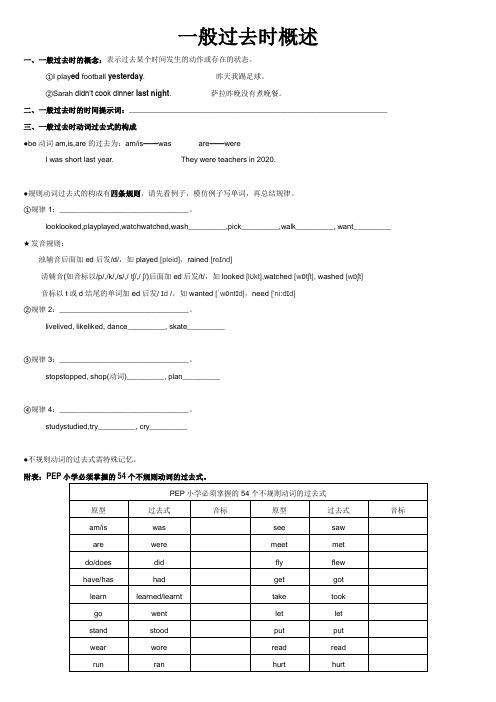
一般过去时概述一、一般过去时的概念:表示过去某个时间发生的动作或存在的状态。
①I play ed football yesterday. 昨天我踢足球。
②Sarah didn’t cook dinner last night. 萨拉昨晚没有煮晚餐。
二、一般过去时的时间提示词:______________________________________________________________三、一般过去时动词过去式的构成●be动词am,is,are的过去为:am/is——was are——wereI was short last year. They were teachers in 2020.●规则动词过去式的构成有四条规则,请先看例子,模仿例子写单词,再总结规律。
①规律1:_______________________________。
looklooked,playplayed,watchwatched,wash_________,pick_________,walk_________, want_________ ★发音规则:浊辅音后面加ed后发/d/,如played [pleid],rained [reɪnd]清辅音(如音标以/p/,/k/,/s/,/ tʃ/,/ʃ/)后面加ed后发/t/,如looked [lʊkt],watched [wɒtʃt], washed [wɒʃt]音标以t或d结尾的单词加ed后发/ɪd /,如wanted [ˈwɒntɪd],need ['ni:dɪd]②规律2:_______________________________。
livelived, likeliked, dance_________, skate_________③规律3:_______________________________。
stopstopped, shop(动词)_________, plan_________④规律4:_______________________________。
PEP六年级下册英语总复习ppt课件
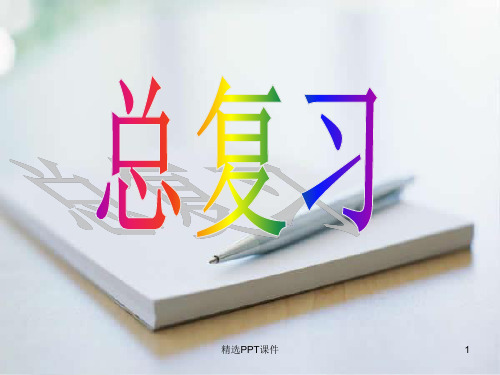
精选PPT课件
18
此课件下载可自行编辑修改,供参考! 感谢您的支持,我们努力做得更好!
精选PPT课件
19
此课件下载可自行编辑修改,此课件供参考! 部分内容来源于网络,如有侵权请与我联系删除!感谢你的观看!
此课件下载可自行编辑修改,此课件供参考! 部分内容来源于网络,如有侵权请与我联系删除!感谢你的观看!
精选PPT课件
16
六、连词成句
1.see , I , elephants , two (.) __I_s_e_e_tw__o_e_le_p_h_a_n_ts__. __________________ 2.what , park , big , a , nature (!) __W_h_a_t_a_b_ig__n_a_tu_r_e_p_a_rk__!________________ 3.good , are ,they , climbers (.) __T_h_ey__a_re_g_o_o_d__cl_im__b_er_s_.________________ 4.elephant ,water ,its ,is ,drinking ,that ,with ,trunk (?) _I_s_th_a_t_e_l_ep_h_a_n_t_d_r_in_k_in_g_w__a_te_r_w_i_th_i_ts__tr_u_n_k_?___________
精选PPT课件
8
变化规则
例词
1.一般词尾加-s
nurse-nurses、student-students book-books、map-maps……
2.以s、x、sh、ch结尾的名词一般在词 watch-watches、class-classes、
尾加-es
英语人教版六年级下册过去时态复习课
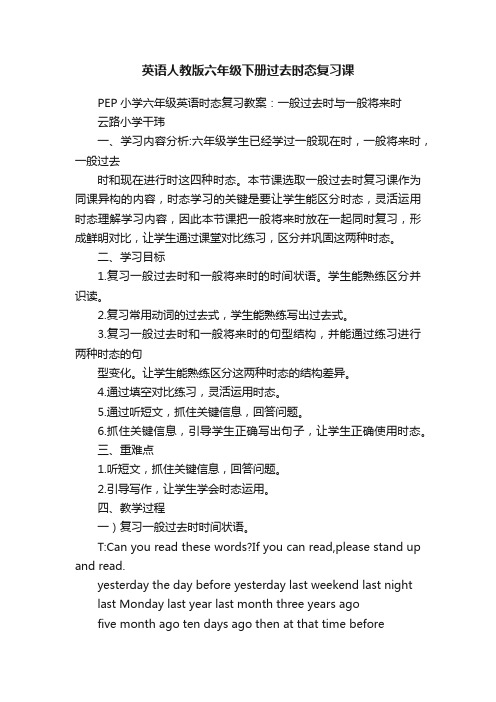
英语人教版六年级下册过去时态复习课PEP小学六年级英语时态复习教案:一般过去时与一般将来时云路小学干玮一、学习内容分析:六年级学生已经学过一般现在时,一般将来时,一般过去时和现在进行时这四种时态。
本节课选取一般过去时复习课作为同课异构的内容,时态学习的关键是要让学生能区分时态,灵活运用时态理解学习内容,因此本节课把一般将来时放在一起同时复习,形成鲜明对比,让学生通过课堂对比练习,区分并巩固这两种时态。
二、学习目标1.复习一般过去时和一般将来时的时间状语。
学生能熟练区分并识读。
2.复习常用动词的过去式,学生能熟练写出过去式。
3.复习一般过去时和一般将来时的句型结构,并能通过练习进行两种时态的句型变化。
让学生能熟练区分这两种时态的结构差异。
4.通过填空对比练习,灵活运用时态。
5.通过听短文,抓住关键信息,回答问题。
6.抓住关键信息,引导学生正确写出句子,让学生正确使用时态。
三、重难点1.听短文,抓住关键信息,回答问题。
2.引导写作,让学生学会时态运用。
四、教学过程一)复习一般过去时时间状语。
T:Can you read these words?If you can read,please stand up and read.yesterday the day before yesterday last weekend last nightlast Monday last year last month three years agofive month ago ten days ago then at that time before二)Can you write the following past tense of the verbs?Let students write first then check the answers.1.do--2. go--3. have--4.sleep--5.see--6.ride--7.take-- 8. eat-- 9. buy--10.fall-- 11.is-- 12.am--13.are-- 14.can-- 15.drink--16.get-- 17.say-- 18.run--19.stay-- 20.wash-- 21.clean-22.watch-- 23.read-- 24.cut--25.put-- 26.study-- 27.like--三)Let’s try1).Mike cleaned the room last night.(变成一般疑问句)2).I stayed at home last weekend.(变成否定句)3).You were short before. .(变成一般疑问句)4).There was a gym in my school twenty years ago. .(变成否定句)四)复习一般将来时时间状语Can you read these words?tomorrow next week next year next Monday next monthtonight next summer holiday in the future五)复习一般将来时句型特征1)be going to +动词原形2)will + 动词原形3)be 的形式的确认表六)一般将来时句型变化练习Let’s try21).She is going to see a film tomorrow. (变成一般疑问句)2).We are going to take a trip next week. (变成否定句)3).My grandma will tell us a story. (变成一般疑问句)4).He will come next Monday. (变成否定句)七)时态对比练习。
六年级英语下册语法知识点总复习人教PEP
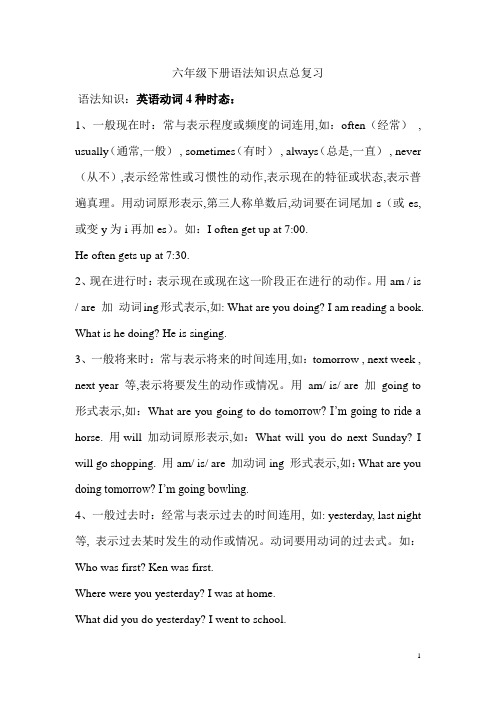
六年级下册语法知识点总复习语法知识:英语动词4种时态:1、一般现在时:常与表示程度或频度的词连用,如:often(经常), usually(通常,一般), sometimes(有时), always(总是,一直), never (从不),表示经常性或习惯性的动作,表示现在的特征或状态,表示普遍真理。
用动词原形表示,第三人称单数后,动词要在词尾加s(或es,或变y为i再加es)。
如:I often get up at 7:00.He often gets up at 7:30.2、现在进行时:表示现在或现在这一阶段正在进行的动作。
用am / is / are 加动词ing形式表示,如: What are you doing? I am reading a book. What is he doing? He is singing.3、一般将来时:常与表示将来的时间连用,如:tomorrow , next week , next year 等,表示将要发生的动作或情况。
用am/ is/ are 加going to 形式表示,如:What are you going to do tom orrow? I’m going to ride a horse. 用will 加动词原形表示,如:What will you do next Sunday? I will go shopping. 用am/ is/ are 加动词ing 形式表示,如:What are you doing tomorrow? I’m going bowling.4、一般过去时:经常与表示过去的时间连用, 如: yesterday, last night 等, 表示过去某时发生的动作或情况。
动词要用动词的过去式。
如:Who was first? Ken was first.Where were you yesterday? I was at home.What did you do yesterday? I went to school.形容词的比较级和最高级:1、单音节词:比较级加er, 最高级加est. 如:tall------taller-------- the tallest,He is taller than his brother. Tom is the tallest in his class.2、多音节词和部分双音节词:比较级加more, 最高级加the most. 如:interesting---------more interesting---------the most interesting,Music is interesting subject. P.E. is more interesting than music.. Science is the most interesting subject.形容词变为比较级的变化规则:(1)一般情况下,在形容词的词尾直接加er。
新版PEP小学六年级英语下Unit2-复习(一般过去时)

What did she do?
She cooked a big meal.
What did he do?
He painted a picture.
Was the man at home yesterday?
No, he wasn’t . He was in the classroom.
Were they in the park?
What did the boy do after school yesterday ?
He played football.
What did he do after class yesterday?
He played basketball.
What did the man read?
He read newspapers.
Yes, they were.
Did the boy play basketball yesterday afternoon?
No, he didn’t . He played football.
Did the man cook breakfast this morning?
Yes, he did.
5. I ____(see) a film with Ann yesterday.
2. She _____ (be) at school this morning.
4. He _____ (do not) live in Guangzhou before 2000.
Exercise
1. _____(be) you busy yesterday afternoon?
Did she…?
Yes, she did.
英语六年级下册过去式知识点
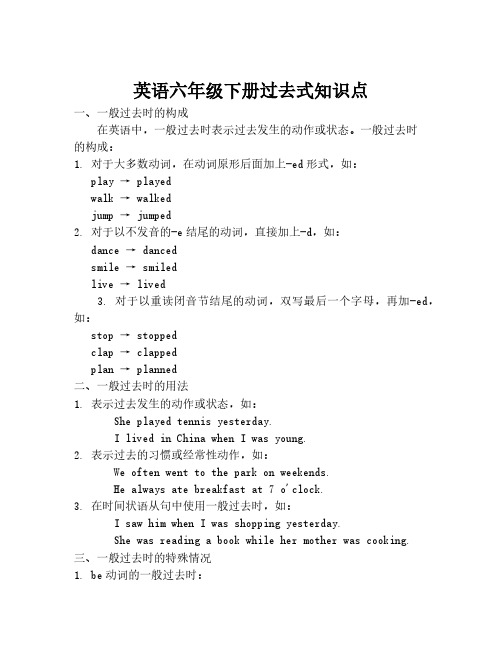
英语六年级下册过去式知识点一、一般过去时的构成在英语中,一般过去时表示过去发生的动作或状态。
一般过去时的构成:1. 对于大多数动词,在动词原形后面加上-ed形式,如:play → playedwalk → walkedjump → jumped2. 对于以不发音的-e结尾的动词,直接加上-d,如:dance → dancedsmile → smiledlive → lived3. 对于以重读闭音节结尾的动词,双写最后一个字母,再加-ed,如:stop → stoppedclap → clappedplan → planned二、一般过去时的用法1. 表示过去发生的动作或状态,如:She played tennis yesterday.I lived in China when I was young.2. 表示过去的习惯或经常性动作,如:We often went to the park on weekends.He always ate breakfast at 7 o'clock.3. 在时间状语从句中使用一般过去时,如:I saw him when I was shopping yesterday.She was reading a book while her mother was cooking.三、一般过去时的特殊情况1. be动词的一般过去时:am/is → wasare → wereI was tired yesterday.They were at the party last night.2. 不规则动词的一般过去时:go → wenthave → hadeat → atebecome → becamecome → camedo → didgive → gaverun → ransee → sawtake → tookthink → thoughtwrite → wrote请注意这些不规则动词的过去式形式,进行适当的记忆和复习。
最新人教PEP六年级下英语-一般过去时态专题 复习课件

句型转换
1. Xiao Lin went fishing this morning.(改为一般疑问句)
2. We visited our teacher last night.(就划线部分提问)
3. He had lunch at school.(改为否定句)
13、生气是拿别人做错的事来惩罚自 己。2021/7/62021/7/62021/7/62021/7/67/6/2021
14、抱最大的希望,作最大的努力。2021年7月6日 星期二2021/7/62021/7/62021/7/6
15、一个人炫耀什么,说明他内心缺 少什么 。。2021年7月 2021/7/62021/7/62021/7/67/6/2021
C. 不规则动词变化需参看不规则动词表逐一 熟记。(一般和过去分词一起记忆)。
D. 基本句式:
常用时间
常与一般过去时态连用的时间有:
yesterday
yesterday morning (afternoon, evening…)
last night (week, month, year…)
two days ago, years ago…
11、人总是珍惜为得到。2021/7/62021/7/62021/7/6Jul-216-J ul-21
12、人乱于心,不宽余请。2021/7/62021/7/62021/7/6Tuesday, July 06, 2021
13、生气是拿别人做错的事来惩罚自 己。2021/7/62021/7/62021/7/62021/7/67/6/2021
_W__a_s_ there _a_n_y__ orange in the cup? That’s great√
过去将来时(讲义)-人教PEP版英语六年级下册
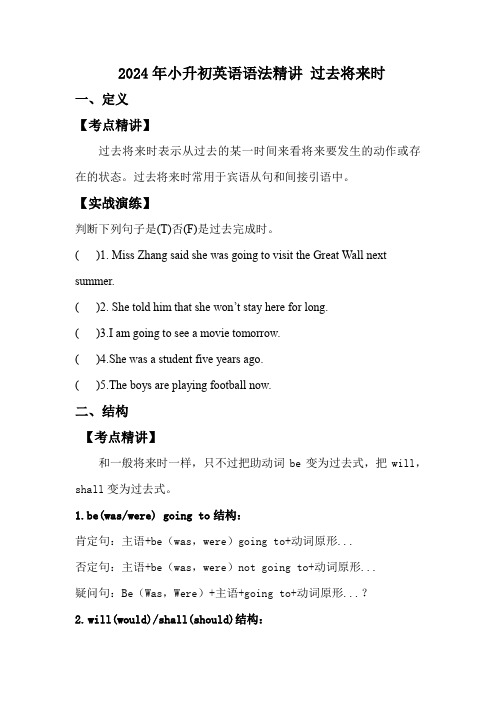
2024年小升初英语语法精讲过去将来时一、定义【考点精讲】过去将来时表示从过去的某一时间来看将来要发生的动作或存在的状态。
过去将来时常用于宾语从句和间接引语中。
【实战演练】判断下列句子是(T)否(F)是过去完成时。
( )1. Miss Zhang said she was going to visit the Great Wall next summer.( )2. She told him that she won’t stay here for long.( )3.I am going to see a movie tomorrow.( )4.She was a student five years ago.( )5.The boys are playing football now.二、结构【考点精讲】和一般将来时一样,只不过把助动词be变为过去式,把will,shall变为过去式。
1.be(was/were) going to结构:肯定句:主语+be(was,were)going to+动词原形...否定句:主语+be(was,were)not going to+动词原形...疑问句:Be(Was,Were)+主语+going to+动词原形...?2.will(would)/shall(should)结构:肯定句:主语+would(should)+动词原形...否定句:主语+would(should)not+动词原形...疑问句:Would(Should)+主语+动词原形...?【实战演练】用所给动词的适当形式填空1. Miss Zhang said she ________(visit) the Great Wall next summer.2. She told him that she ________(not stay) here for long.3. I wasn’t sure whether Lucy_______(e) the next year.4. The scientists said the world’s population _______ (slow) down in future.5. She said the bus _______(leave) at five the next morning.三、过去将来时的用法【考点精讲】1.“would+动词原形”常表示主观意愿的将来。
人教PEP六年级下册英语一般过去式讲解与综合练习

一般过去时(一)基础夯实:一般过去时1.一般过去时表示过去某个时间发生的动作或存在的状态,常和表示过去的时间状语连用。
一般过去时也表示过去经常或反复发生的动作感谢。
2.Be动词在一般过去时中的变化:⑴am 和is在一般过去时中变为was。
(was not=wasn’t)⑵are在一般过去时中变为were。
(were not=weren’t)⑶带有was或were的句子,其否定、疑问的变化和is, am, are一样,即否定句在was或were后加not,一般疑问句把was或were调到句首。
3.句中没有be动词的一般过去时的句子否定句:didn’t +动词原形,如:Jim didn’t go home yesterday.一般疑问句:在句首加did,句子中的动词过去式变回原形。
如:Did Jim go home yesterday?特殊疑问句:⑴疑问词+did+主语+动词原形?如: What did Jim do yesterday?⑵疑问词当主语时:疑问词+动词过去式?如:Who went to home yesterday?基础夯实:动词的过去式请熟记以下不规则动词的过去式:am/is—was are—were do—did go—wentcome—came swim—swam run—ran sing—sangdrink—drank give—gave begin—began win—wonhave—had get—got eat—ate sit--satfeel—felt sleep—slept sweep—swept leave—leftsee—saw draw—drew fly—flew blow—blewknow—knew throw—threw tell—told take—tookmake—made say—said ride—rode write—wroteput— put set—set hurt—hurt read—readbuy—bought teach—taught think—thought catch—caughtfight—fought bring—brought一般过去时的肯定陈述句一般过去时表示过去某个时间发生的动作或存在的状态,常用的时间状语有:yesterday , just now , last +时间, … ago , in 1980等。
六年级英语下册专题讲解:Unit 3 Where did you go?(一般过去时态)人教PEP版

Unit3Where did you go?1. 能够听、说、读、写rode a horse ,rode a bike ,went camping ,hurt my foot ,went fishing等词组。
2. 能够运用核心句型Where did you go …? What did you do …? 及词组谈论假期的活动。
3. 能够掌握一般过去时的动词变化规则。
重点:1. 词汇:rode a horse ,rode a bike ,went camping ,hurt my foot ,went fishing。
2. 句型:Where did you go …? What did you do …?难点:1. 能够运用本课的核心句型Where did you go …? What did you do …? 进行简单的交流。
2. 掌握一般过去时的动词变化规则。
Step1Warm-up1. Let’s sing ;唱【one little finger】通过英语律动,活跃课堂气氛。
2. Review; 复习一些动词的过去式。
3. Step2Presentation1.2.T: Now let’s start to learn some new words of the past tense of verbs.并根据周一张鹏和约翰去上学时的对话引出句型:where did you go?what did you do?(1) 教师出示词组go camping,并提问What did you do? 然后出现go camping 的过去式went camping,学生听音跟读,并用I went camping. 进行回答。
(2) 教师出示词组ride a bike 及其意思,并提问What did you do? 然后出现ride a bike 的过去式rode a bike,学生听音跟读,并用I rode a bike. 进行回答。
小升初时态专题复习---一般过去时态(讲义)人教PEP版英语六年级下册
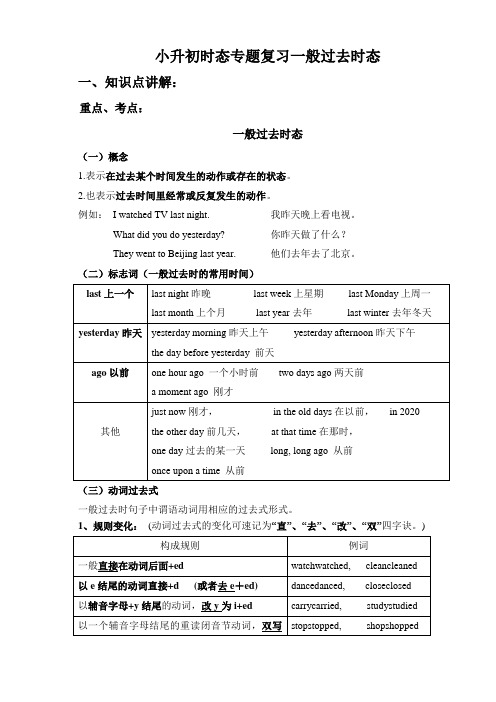
小升初时态专题复习一般过去时态一、知识点讲解:重点、考点:一般过去时态(一)概念1.表示在过去某个时间发生的动作或存在的状态。
2.也表示过去时间里经常或反复发生的动作。
例如:I watched TV last night. 我昨天晚上看电视。
What did you do yesterday? 你昨天做了什么?They went to Beijing last year. 他们去年去了北京。
(二)标志词(一般过去时的常用时间)(三)动词过去式一般过去时句子中谓语动词用相应的过去式形式。
1、规则变化:(动词过去式的变化可速记为“直”、“去”、“改”、“双”四字诀。
)词尾辅音字母,再+ed2、不规则变化:①常见的拼写不变动词(AA型)letlet putput costcost cutcut hithit hurthurt readread②其他不规则(AB型)am/is was arewere dodid gowenthavehad ecame makemade taketook[来源:学. knowknew leaveleft loselost learn learned swimswam runran getgot sitsatsaysaid seesaw sellsold sendsentbuybought thinkthought teachtaught bringbroughteatate drawdrew drinkdrank drivedrovesingsang speakspoke standstood wakewokefallfell feelfelt findfound givegavewinwon willwould shallshould cancouldflyflew hearheard keepkept sleepslept(四)时态与句型1、谓语动词是be动词时,一般过去时的构成形式,详见下表:一般过去时的构成形式: be 动词肯定式疑问式否定式I was... Was I ...? (或Were you ...?) I was not ...He / She / It was... Was he / she / it ...? He / She / It wasn't ...We / You / They were ... Were we / you / they ...? We / You / They weren't ... 即:主语+be(过去式)+其他否定句:主语+be(过去式)+not+其他(wasn’t weren’t)一般疑问句:Be(过去式)+主语+其他(第一人称变为第二人称)特殊疑问句:疑问词+Be(过去式)+主语+其他(第一人称变为第二人称)例如:I was at home yesterday evening.否定句:I was not at home yesterday.一般疑问句:Were you at home yesterday? Yes, I was. / No, I wasn’t.特殊疑问句:Where were you yesterday evening? I was at home.2、谓语动词是实义动词时(句中没有be动词),一般过去时的构成形式,详见下表:一般过去时的构成形式: 实义动词肯定式疑问式否定式I worked ... Did you (或I) work ...? I didn't work ...He /She /It worked ... Did he / she / it work ...? He / She / It didn't work ...We / You / They worked ... Did you / we / they work ...? We / You / They didn't work ... 即:主语+实义动词过去式+其他否定句:主语+didn’t+动词原型+其他一般疑问句:Did +主语+动词原形+其他(第一人称变为第二人称)特殊疑问句:疑问词+ did +主语+动词原形+其他(第一人称变为第二人称)例如:I watched TV last night.否定句:I didn’t watch TV last night.一般疑问句:Did you watch TV la st night? Yes, I did. / No, I didn’t.特殊疑问句:What did you do last night? I cleaned my room.二、课堂练习:I、写出下列单词的过去式形式。
人教PEP版英语六年级下册小升初复习一般过去时(课件)
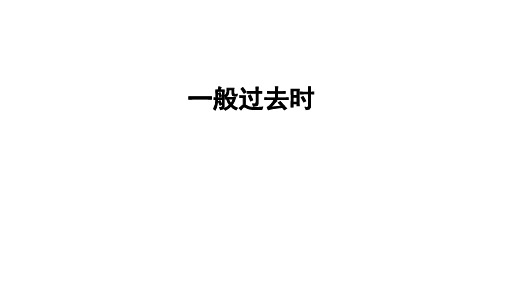
Was/Were+主语+其他? 肯定回答:Yes, 主语
—Was he a teacher?他曾经是位 老师吗?
+was/were.
一般 否定回答:No, 主语
疑问 句
+was/were+not. Did+主语+动词原形+其 他?
—Yes, he was. /No, he wasn’t. 是的, 他是。/不, 他不是。
—Did Lingling get up at 6:30 yesterday?
肯定回答:Yes, 主语+did. 玲玲昨天是 6:30 起床的吗?
否定回答:No, 主语
—Yes, she did. /No, she didn’t.
+did+not.
是的, 她是。/不, 她不是。
特殊疑问词+was/were+ 特殊 主语+其他? 疑问
3. Li Lei sang and danced yesterday. (改为一般疑问句) Did Li Lei sing and dance yesterday?
A. play
B. played
C. will play
( )2. We
school at nine last night.
A. leaved
B. left
C. leaving
1. 本题考查一般过去时的肯定句。由句中的时间状语 last night(昨晚)可知, 玩游戏发生在过去, 所以句中动词需要变为过去 式。A 选项为动词原形;B 选项为动词过去式;C 选项为动词在一般 将来时中的用法。2. 考查一般过去时的用法, 由 last night 可知时间 为过去时, 所以句中的 leave 应用过去式, leave 为不规则动词, 其过 去式为 left。
小升初语法一般过去时(讲义)人教PEP版英语六年级下册

过去时态定义:1.一般过去时表示过去某个时间里发生的动作或状态;2. 过去习惯性、经常性的动作、行为;3. 过去主语所具备的能力和性格。
基本结构:主语+动词过去式+其他;一般疑问句:Did +主语+动词原形...? Yes,…did./ No, …didn’t.否定形式:①was/were+not; I wasn’t at home yesterday morning.②在行为动词前加didn't,保持行为动词原形;He didn’t go to school yesterday.动词过去式规则变化:1.直接加ed:work—— worked look——looked play——played,2.以不发音e结尾的单词,直接加d:live ——lived hope——hoped use——used,3 . 以辅音字母+y结尾的,变y为i加ed:study—— studied carry——carried worry——worried,以元音字母+y结尾的,直接加ed:enjoy ——enjoyed play——played4. 以重读闭音节结尾的,双写最后的辅音字母+ed:stop—— stopped plan——planned不规则变化的动词过去式:(见下发的表格)不规则动词的过去式变化则没有什么规律,请大家背熟记牢:sit ——satthrow ——threwam, is ——wasdrink ——drankdraw ——dreware ——weresing ——sangfly ——flewdo ——didbegin ——begangrow ——grewhave, has ——hadswim ——swamput ——putmay ——mightgive ——gavecut ——cutcan ——couldring ——ranglet ——letshall ——shouldrun ——ranread ——readwill ——wouldride ——rodecatch ——caughtgo ——wentwrite ——wroteteach ——taught eat ——atedrive ——drove think ——thought hear ——heard keep ——kept buy ——bought see ——saw sleep ——slept fight ——fought find ——found sweep ——swept hold ——held wear ——wore feel ——felttell ——told meet ——mete ——cameget ——got mean ——meant bee ——became make ——made speak ——spoke take ——took say ——said1)is, am was arewere2) beginbegan ringrang drinkdrank swimswam givegavesingsangsitsatrunranhavehad makemadeecameeatate3) writewrote riderode speakspoke drivedrove standstoodtelltoldwinwongetgottaketook4) sleepsleptsweepsweptfeelfeltkeepkeptspellspeltspendspentbendbentmeetmetgowent5) knowknewflyflewblowblewgrowgrewthrowthrewdrawdrew(glowglowed)6) teachtaughtcatchcaughtbuyboughtfightfoughtthinkthought7) findfoundhearheardsaysaidlielayseesawlearnlearntmeanmeant8) putputreadreadcutcutletlet一般过去时练习一、请用正确动词形式填空。
一般过去时(讲义)人教PEP版英语六年级下册

find—found—found(发现、找到)get—got—got meet—met—met sit—sat—sat win—won—won
feel—felt—felt (感到) keep—kept—kept保持leave—left—left离开sweep—swept—swept扫
8. Today _____ the second of June. Yesterday ______ the first of June. It_____ Children’s Day. All the students ______ very excited.
二、写出下列动词的过去式
is\am_________ fly_______ plant________ are ________
一般疑问句:Was/ Were+主语+其他
Did +主语+动词原形+其他
特殊疑问句:特殊疑问词+ was/were +主语+其他
特殊疑问词+ did +主语+动词原形+其他
随堂检测
●及时小练:
一、用be动词的适当形式填空
1. I ______ an English teacher now.
2. She _______ happy yesterday.
否定句:________________________________
一般疑问句:________________________________
肯定回答:_________否定回答:_________
特殊疑问句:________________________________
六年级下册英语课件-一般过去时复习-人教pep.ppt
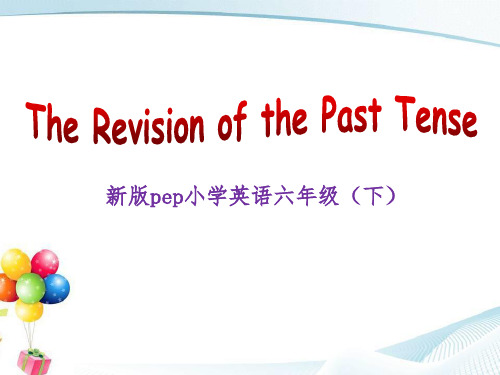
for our friends. We had a good time. We liked Qingdao very much.
Challenge3 Can you write the original form of the words?(你能写出下列过去式的原型吗?)
新版pep小学英语六年级(下)
T:I say am Ss:I say was. T:I say do Ss:I say did. T:I say go Ss:I say went. T:I say are Ss:I say were. T:I say read Ss:I say read. T:I say take Ss:I say took.
swam in took bought visited my
ate
played in the
the sea pictures gifts grandparents seafood(海鲜)
sea
Grade ...
past
Grade 6
now
Grade ...
future
Challenge2 Read and circle:从文中找出
如:dance---danced love----loved
live---lived
like----liked
动词过去式的规则变化
3.以“辅音字母+y”结尾的,变y为i,再加-ed,
如:study---studied
try---tried
cry---cried
worry---worried
动词过去式的规则变化
- 1、下载文档前请自行甄别文档内容的完整性,平台不提供额外的编辑、内容补充、找答案等附加服务。
- 2、"仅部分预览"的文档,不可在线预览部分如存在完整性等问题,可反馈申请退款(可完整预览的文档不适用该条件!)。
- 3、如文档侵犯您的权益,请联系客服反馈,我们会尽快为您处理(人工客服工作时间:9:00-18:30)。
8.Amy____busy yesterday evening.
A.was B.is C.do 9._____you _____your room last Saturday?
A.Do, cleaned B.Did, cleaned C.Did,clean
(C)
连词成句。
(1)you , what, yesterday , do , did (?)
A.fish B.fishes C.fishing 4.I __end. B.visiting C.visit
(C)
(A)
A.visited
5.----What did you do yesterday?
----_________.
A.At 5:00 B.I wen by train.
I went swimming yesterday.
动词过去式构成规则
规则动词
①一般在词尾加ed:如 worked , learned , cleaned , visited ②以不发音字母e结尾的动词在词尾加d:如 lived , danced , used ③以辅音字母加y结尾的要变y为i再加ed:如 study – studied carry – carried worry – worried(注 意play、stay不是辅音字母加y,所以不属于此类) ④以重读闭音结词结尾,末尾只有一个辅音字母 的动词,先双写这个辅音字母,再加ed如 stopped
单项选择。 1.----_____did he do on the weekend? ----He went hiking. A.How B.What 2.----____ you go to the park?
(B)
C.What’s
(C)
----Yes,I did. A.Do BDoes C.Did 3.----What did you do yesterday? ----I went ____with Tom.
thought think----- _______
一般过去时的用法
一般过去时态(The Simple Tense) 一般过去式表示过去某个时间发生的动作或存在的 状态,常和表示过去的时间连用,如:yesterday, last weekend, last Sunday,last holiday等。也表 示过去经常或反复发生的动作。 例如:I watched TV last weekend.
What did you do yesterday?
(2)last ,played ,Sunday , I ,football (.) I played football last Sunday. (3)Did ,on, weekend, swimming, go, the ,you(?) Did you go swimming on the weekend? (4 learned, night, last, English, she, at (.)
Practice
按要求完成句子
1.He took many pictures yesterday?(改为一般 疑问句) Did he take many pictures yesterday? 2.His father ran very fast.(改为一般疑问句) Did his father run very fast? 3.I went to luxi last sunday.(改为一般疑问句) Did you go to luxi last sunday?
Practice
按要求完成句子
(1)I was tired yesterday.(改为否定句) I wasn't tired yesterday (2)I got up early this morning.(改为否定句) I didn't got up early this morning.
Practice
不规则动词
(此类词并无规则,须熟记)小学阶段要记住以下动词的 原形和过去式:
sing – sang eat – ate see – saw have – had do – did go – went take – took buy – bought get – got read – read fly – flew am/is – was are – were say – said leave – left swim – swam tell – told draw – drew come – came lose – lost find – found drink – drank hurt – hurt feel – felt
(C)
C.I learned Chinese.
6.I_____good _______yesterday.
A.eated,foods B.eats,foodes C.ate,food
(C)
(B) (A)
7.What did you do ___your holiday? A.in B.on C.at
stayed at home
watched TV
played badminton
went cycling
rode a bike
played basketball
快速写出下列动词的过去式:
ride-------- _______ rode ate eat -------- _______ took take ----- _______ studied study ---- _______ licked lick------- _______ taught teach----- _______ hurt hurt------- _______ read read------ _______ bought buy-----_______ climbed climb------_______ wrote write------- _______ tripped trip-------_______ drank drink-------_______
She learned English at last night.
按要求完成下列各题。
1.I planted a flower yesterday afternoon.(对画线部分提问) What _______ did you _______yesterday do _______ afternoon? 2.Tom went fishing last Sunday.(对画线部分提问) Who ______went fishing last Sunday? 3.I do my homework every day.(用yesterday evening替换 every day) did my homework yesterday evening I _____ 4.Did you watch TV last night?(做肯定回答) ______,_______ Yes I _________. did
一般过去时陈述句改一般疑问句
(1)有be动词的直接把be动词was/were提到句首
eg:They were at home last night.(改为一般疑问句)
Were they at home last night?
(2)没有be动词的在句首加Did,把原句中过去式改 为动词原形 eg:He whatched TV last weekend.(改为一般疑问 句) Did he whatch TV last weekend?
人教版pep英语六年级下册
一般过去时专题复 习
warm-up
1.how was your weekend?
2.what did you do last weekend? 3.did you clean you room?
用过去式写出相应的短语
cleaned my room
washed my clothes
一般过去时肯定句改否定句
(1)有be动词的直接在be动词后加not eg:He wasn't at work yesterday. (2)没有be动词的在主语后面加didn't把原句中过去 式改为动词原形。 eg:He went camping yesterday. (改为否定句) He didn't go camping yesterday.
